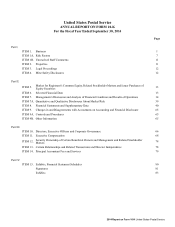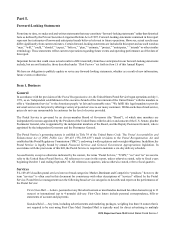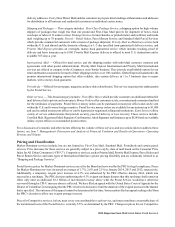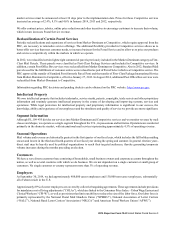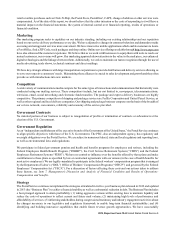US Postal Service 2014 Annual Report Download - page 13
Download and view the complete annual report
Please find page 13 of the 2014 US Postal Service annual report below. You can navigate through the pages in the report by either clicking on the pages listed below, or by using the keyword search tool below to find specific information within the annual report.
2014 Report on Form 10-K United States Postal Service 9
Our ability to negotiate contracts that control labor costs is essential to maintaining financial stability. We have no assurance
that we will be able to negotiate contracts in the future with our unions that will result in a cost structure that is sustainable
within current and projected future revenue levels. In addition, if our future negotiations should fail and involved parties
proceed to arbitration, we would be deprived of control in the collective bargaining process. The risk of an adverse outcome
rises in arbitration, as there is no current statutory mandate requiring an interest arbitrator to consider the financial health of the
Postal Service in issuing an award. An unfavorable award in arbitration could have significant adverse consequences on our
ability to meet future financial obligations.
We rely on the terms and conditions of our contracts with vendors and customers to deliver our services. These contracts are
renegotiated on a routine and periodic basis. Significant changes in the costs, pricing or terms associated with these
contracts could adversely affect our business.
Some of our suppliers and customers enter into long-term contracts with us to supply goods and services and to procure our
services. These contracts are renegotiated from time to time and to the extent that contracts are not renewed, or are renewed
with terms that may not sufficiently cover our costs or increase our costs, may have an adverse effect on our business. While no
single customer or supplier is material to the Postal Service as a whole, certain vendors and customers are significant to the
delivery of certain product lines. Our ability to maintain current or improved terms in our contracts with our customers and
suppliers is critical to our initiatives to return to profitability.
Fuel expenses are a material part of our operating costs. A significant increase in fuel prices could adversely affect costs and
results of operations.
We are exposed to changes in commodity prices, primarily for diesel fuel, unleaded gasoline and aircraft fuel for transportation
of mail and natural gas and heating oil for facilities. The price and availability of fuel can be unpredictable and is beyond our
control. Unlike commercial entities, we are unable to institute fuel surcharges in our pricing model. Additionally, because we
also use contracted carriers to transport the mail, we anticipate that increased operating costs for these independent carriers,
including increased costs resulting from rising fuel prices, may ultimately be passed through to the Postal Service.
We rely extensively on computer systems and technology to manage the delivery of mail, process transactions, summarize
results and manage our business. Disruptions in both our primary and back-up systems could harm our ability to run our
business and potentially result in significant losses of revenue or additional operating costs. In addition, such disruptions
could impair our reputation for reliable service, which would also adversely affect results of operations.
Our operational and administrative information systems are among the largest and most complex systems maintained by any
organization in the world. Any disruption to our infrastructure, including those impacting computer systems that facilitate mail
handling and delivery and customer-utilized websites, could adversely impact customer service, mail volume and revenue and
result in significant increased cost. Any significant systems failure could cause delays in the processing and delivering of mail
or result in the inability to process operational and financial data.
Cyber attacks are a continuing threat to businesses and agencies that maintain data electronically and the Postal Service is not
immune to such attacks. A 2013 Government Accountability Office report stated that from 2006 through 2012 the number of
cyber incidents reported by federal agencies to the U.S. Computer Emergency Readiness Team increased 782 percent. In
addition, reports of cyber incidents affecting national security, intellectual property and individuals have been widespread, with
reported incidents involving data loss or theft, economic loss, computer intrusions and privacy breaches. The ability to maintain
confidentiality, integrity and availability of information is critical to fulfilling our mission. The source of such threats is wide-
ranging and system failures resulting from these threats could damage our reputation, resulting in loss of business and increased
costs.
We discovered a data breach in the fourth quarter of 2014, which involved the theft of certain personally identifiable
information and customer addresses through unauthorized access to our network. As of the date of the filing of this report, we
do not believe there to be any impact to our financial systems or material impact to the financial information presented in this
Annual Report.
Due to our recent and projected cash constraints, our operational performance in the future could be at risk as a result of
inadequate capital investment in facilities, transportation equipment, mail processing equipment or information technology
infrastructure, all of which are essential for our operations.
If our operations do not generate the liquidity we require, we may be forced to reduce, delay or cancel investments in
technology, facilities and/or transportation equipment, as we have done in the recent past, while our competitors and other
businesses are pursuing advanced, competing technologies and equipment. Additionally, our aging facilities, equipment and


